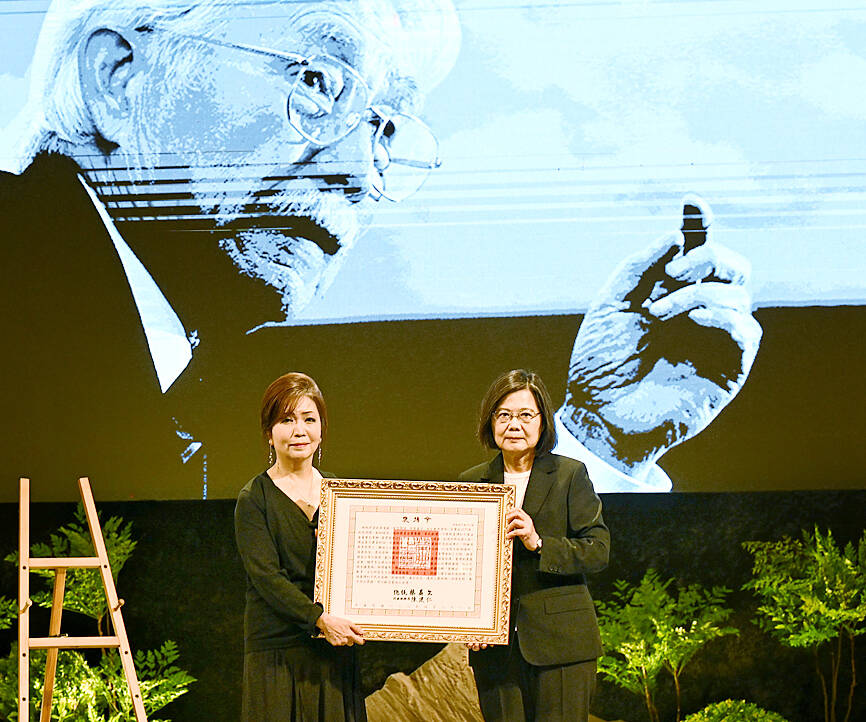A memorial held yesterday for late Taiwanese independence advocate and senior presidential adviser Koo Kwang-ming (辜寬敏) paid tribute to Koo’s efforts toward the normalization of Taiwan’s international status.
Koo passed away on Feb. 27 at the age of 97.
What concerned Koo most was the relationship between Taiwan and China, said his son Richard Koo (辜朝明), who is the chief economist at Japan’s Nomura Research Institute.

Photo: Fang Pin-chao, Taipei Times
Koo Kuang-ming had believed that Taiwan could not develop as a normal country unless it had peaceful relations with China, and had proposed the concept of a “federation of brothers” in which both countries would recognize each other’s independence and enjoy mutually beneficial ties.
Richard Koo said at the service that what impressed his family most about his father was his business achievements.
“My father had failed in the past, and was 68 when he finally established a successful business,” he said.
Upon Koo Kuang-ming’s return from Japan 35 years ago, he was advised by his friend Yang Tsung-che (楊宗哲) that career success wields influence in Taiwan, Richard Koo said.
“He traveled to several Pacific island countries in the process of starting his own business in the fisheries,” he said.
Koo Kwang-ming believed that declaring independence would not be difficult for Taiwan, but it would be more of a struggle to establish a framework for Taiwan and China to peacefully coexist and share interests.
Koo Kwang-ming said that Taiwan and China could share close ties if the right conditions were met.
“Before he was hospitalized, my father often called me in Tokyo to talk about how he could share his thoughts on cross-strait ties with the Chinese leadership,” he said. “I believe that my father is looking upon us from heaven, and is delighted to see us continuing to work hard for Taiwan.”
Also speaking at the memorial, Vice President William Lai (賴清德) cited Koo Kwang-ming’s proposal of a “federation of brothers,” saying Taiwan and China can coexist as allies and thrive together across the Taiwan Strait.
The Pacific Ocean is “large enough to accommodate competition between the US and China, and the Taiwan Strait is wide enough to allow Taiwan and China to both survive and develop,” he said.

Chinese spouse and influencer Guan Guan’s (關關) residency permit has been revoked for repeatedly posting pro-China videos that threaten national security, the National Immigration Agency confirmed today. Guan Guan has said many controversial statements in her videos posted to Douyin (抖音), including “the red flag will soon be painted all over Taiwan” and “Taiwan is an inseparable part of China,” and expressing hope for expedited reunification. The agency last year received multiple reports alleging that Guan Guan had advocated for armed reunification. After verifying the reports, the agency last month issued a notice requiring her to appear and explain her actions. Guan

GIVE AND TAKE: Blood demand continues to rise each year, while fewer young donors are available due to the nation’s falling birthrate, a doctor said Blood donors can redeem points earned from donations to obtain limited edition Formosan black bear travel mugs, the Kaohsiung Blood Center said yesterday, as it announced a goal of stocking 20,000 units of blood prior to the Lunar New Year. The last month of the lunar year is National Blood Donation Month, when local centers seek to stockpile blood for use during the Lunar New Year holiday. The blood demand in southern Taiwan — including Tainan and Kaohsiung, as well as Chiayi, Pingtung, Penghu and Taitung counties — is about 2,000 units per day, the center said. The donation campaign aims to boost

The Kaohsiung Tourism Bureau audited six hotels in an effort to prevent price gouging ahead of Korean band BTS’ concert tour in the city scheduled for Nov. 19, 21 and 22 this year. The bureau on Friday said that the audits — conducted in response to allegations of unfair pricing posted on social media — found no wrongdoing. These establishments included the local branches of Chateau de Chine, Hotel Nikko, My Humble House, and Grand Hai Lai, it said, adding that the Consumer Protection Commission would have penalized price gougers had the accusations been substantiated. The bureau said the Tourism Development Act

The Central Weather Administration (CWA) said a magnitude 4.9 earthquake that struck off the coast of eastern Taiwan yesterday was an independent event and part of a stress-adjustment process. The earthquake occurred at 4:47pm, with its epicenter at sea about 45.4km south of Yilan County Hall at a depth of 5.9km, the CWA said. The quake's intensity, which gauges the actual effects of a temblor, was highest in several townships in Yilan and neighboring Hualien County, where it measured 4 on Taiwan's seven-tier intensity scale, the CWA said. Lin Po-yu (林柏佑), a division chief at the CWA's Seismological Center, told a news conference